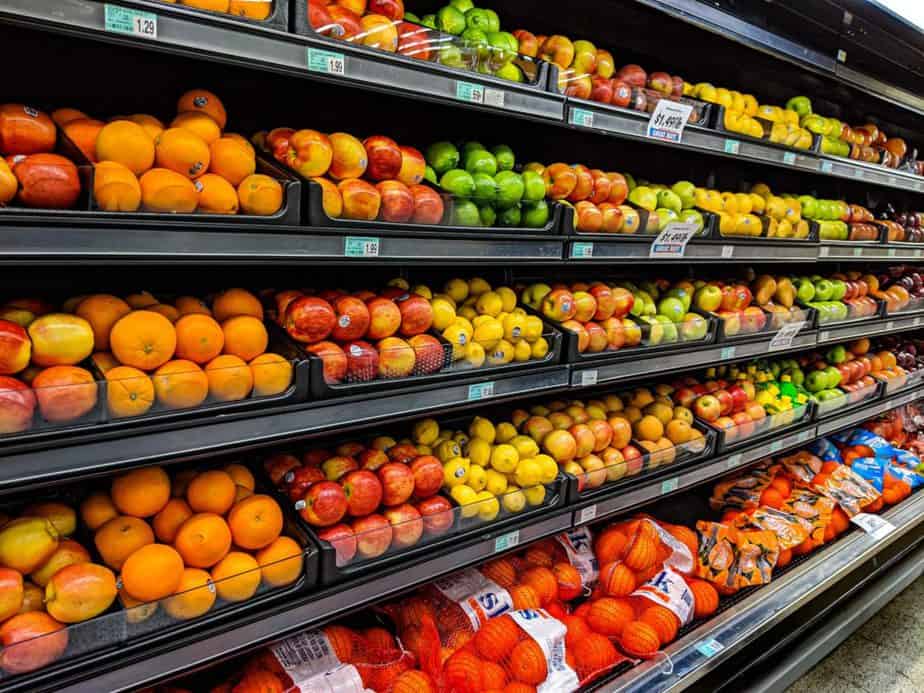Whenever we go to supermarkets to buy our groceries, we always wonder how supermarkets store and keep fruits, vegetables, and other produce fresh. We sometimes also encounter spoiled fruits and vegetables at the supermarkets, they expel such foul smells. Some supermarkets fail to keep the fruits and vegetables fresh for longer and in the end, they have to get rid of all the stale produce. Let’s learn ‘How do Supermarkets store Fruits?’.

How do Supermarkets store Fruits?
We all understand that the fruits and vegetables sold in supermarkets are not that fresh. It’s not like the fruits were brought to the supermarket the same day for selling. There are some ways and tactics by which supermarkets store and keep all the fruits and vegetables fresh for a long period.
Just like we keep all the perishable stuff in the refrigerator, similarly, supermarkets have refrigerators too but not like the refrigerators we have in households. The items are kept in large, refrigerated coolers in the back of supermarkets.
Using Refrigerators for keeping fruits fresh
- At the end of each day, all the unsold fruits are brought back from the supermarket to the back to be placed in the refrigerator.
- This method is known to extend the shelf life of fruits and vegetables.
- While most of the fruits and vegetables are required to be stored in these large refrigerators to prevent spoiling, some can be left out.
- Refrigeration is not only used to keep the fruits and vegetables fresh but sometimes it is also used to slow down the ripening.
Apart from refrigeration, these supermarkets also use chemicals to delay the process of ripening and perishing fruits
Use Of Chemicals
- Fruits and vegetables are sometimes chemically treated to make them look appealing for a longer period.
- Apples are typically waxed to improve their appearance and slow deterioration. Some fruits can be stored for up to 6 or 12 months. The time required for the preservation process varies depending on the fruit. It could also be days, weeks, or months.
- Apples are sometimes coated in a soy-protein mixture with pullulan, Pullulan is a polysaccharide polymer. This is known to slow the decaying process.
- Wax coating the fruits helps in keeping molds away and retaining their juiciness.
Now after reading about the chemical treatment of fruits and vegetables to keep them looking fresh and attractive, you must be wondering that –
Is consumption of chemically treated fruits safe?
According to the experts, it is safe to consume chemically treated produce. There are not many nutrients lost in the process and you don’t consume anything toxic, so it is safe to consume it. However, the wax on these fruits is indigestible. This is going to give you digestion issues in the long run. So if this makes you uncomfortable, you should buy not chemically treated produce.
How do supermarkets store cut fruits?
Supermarkets work strategically. The moment they sense a certain set of fruits is turning bad and going to waste, they make a fruit salad out of it to sell to the customers. The fruit salad is kept in airtight containers and under constant refrigeration. This is the supermarket’s last way to save the fruit from getting wasted and thrown away.
But you should know that buying pre-cut fruits is much more expensive and not that much of a healthy choice. These pre-cut fruit boxes are more likely to have bacteria, molds, and much less nutritional value.
Conclusion
Supermarkets use various methods to store fruits and other produce. The two basic methods are refrigeration and chemical treatment. These two methods help in prolonging their shelf lives and keeping them fresh. Supermarkets want minimal wastage and maximum profits. They do what they must to achieve maximum profits.
Frequently Asked Questions
Q1 How do supermarkets store bananas?
Banana Is a type of fruit that can rot and get mushy very easily. Supermarkets order bananas when they are raw. They let them ripe in their refrigerators. Refrigerators are known to slow down the ripening process. The bananas are packed in large boxes while shipping. During shipping also, the bananas are stored in refrigerators so that they cannot ripe while shipping too. On reaching the final destination, bananas are chemically treated to ripe them forcefully. Ethylene gas is used as the chemical here. The bananas are stored in sealed rooms where the gas will stay locked. After this, the room’s temperature is increased to ripe them.
Q2 What happens to the stale produce at the supermarkets?
When fruits and vegetables rot completely, supermarkets have no other choice than to throw everything away. Sometimes supermarkets go through a lot of loss financially when they have to throw out the items they bought to sell. Sometimes supermarkets also donate the produce. For example, day-old bread, non-moldy fruits and vegetables, and other items are given away by supermarkets to the people in need.
